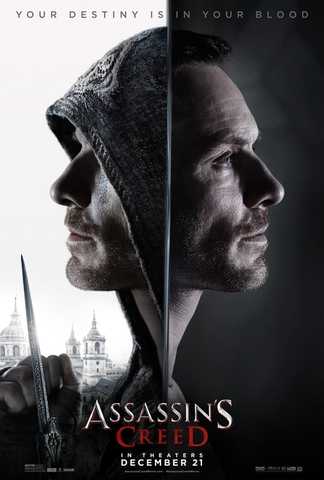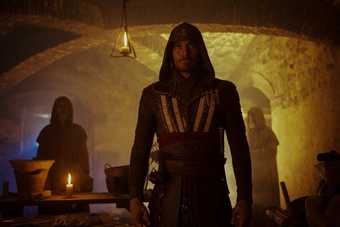Written by Mike CervantesTHIS IS THE EMERGENCY SPOILER ALERT SYSTEM...YOU ARE ADVISED TO READ AT YOUR OWN RISK... So, here I am, reviewing a game-based movie again. It’d be a terrible, torturous existence if I didn’t actually volunteer to write these articles. Before I went out to see Assassin’s Creed, I had already caught wind of a couple of bad reviews, predictably from video game-based blogs, that were all too eager to give this one a silent takedown for its inability to capture the immersion of the video game series it’s based on, originally created by Ubisoft in 2007. The game takes the stealth gameplay originated in Metal Gear Solid, and throws in some more throat-slitting and jumping off of buildings. It’s a mechanic that was certainly original when the first game made its debut on the Playstation 3, but it has since spanned 17 games, including spinoffs, and its gameplay has generally been improved by more high-profile titles like Rocksteady’s Batman: Arkham Asylum series. Right off the bat, there’s a challenge in translating this series to film, because of the game’s expanded lore, but there’s also a distinct storyline mechanic involved with Assassin’s Creed, that suggests the majority of the gameplay is based inside of a virtual reality matrix called “The Animus,” giving the player a logical reason to rewind and restart events during gameplay. The split between futuristic sci-fi and medieval alternate history settings can be both accepted and thoroughly relished in a video game setting, but translating such a complex premise into a linear media like film means that finding the balance between the two contrasting themes is bound to be a struggle. And this movie struggles. An opening text crawl and a few jagged flashbacks give us the premise: there exists in this world an ancient artifact known as 'The Apple of Eden,' which is mystically known as the lone macguffin that can eliminate all violence in the world, at the expense of man’s free will. For centuries there have been two warring factions: The Assassins and the Templars, who have fought over possession of the Apple, in order to support their contrasting ideologies. Fast forward to modern times where a descendant of the Templars, Sophia Rivkin (Marion Cotillard) has learned the Apple contains a genetic code that promotes obedience in human beings. Purely out of scientific interest, she tracks down the descendant of an assassin, Callum Lynch (Michael Fassbender), on death row after a tortured existence that began when his father (Brendan Gleeson) murdered his mother in full Assassin garb. Rivkin, with the encouragement of her own Templar-cultist father (Jeremy Irons), wastes no time inserting Cal into the Apple, forcing him to re-live the memories of his Spanish Inquisition-era ancestor, Aguilar de Nerha.  The narrative thus plays out more in the modern era than the historic period that would be more central in the game series. Anything resembling plot is played out in the vast white walls of the Templar science lab, as Cal and Sophia slowly come to realize the significance of their rivalry while working contentiously to unlock the secrets of the Apple of Eden. Meanwhile, the segments with Aguilar in the past play out like marathon kinetic race-to-the-finish action sequences, reminiscent of Indiana Jones or Universal’s The Mummy. Seeing the enormous parkour action interposed with the antiseptic dramatic moments surrounding the Templar lab, it’s easy to feel like you’re part of the same experiment that Cal is experiencing, but not in a good way. Some interesting choices were made, seemingly to assist this movie in being ‘taken more seriously’ then your average video game-based film. The sadistic joy of sailing off a rooftop to slit an NPC’s throat doesn’t exist in this film. In fact, there seems to be a PG-13 level set of violence discretion shots throughout the film. The plot is consistently treated as though it has more gravity than the action, but in its attempt to be smarter, it blatantly ignores what is innately dumb about the premise: the Templars have been scientifically after this code for centuries. Why didn’t they write their own version of it? Then they made the obvious mistake of keeping several other ancestral Assassins, played most significantly by Michael K. Williams and Matias Varela, so they’d inevitably break out and kill every Templar scientist in the vicinity. The movie, ironically, succeeds in hitting the tone that the game series always seems to, in that it’s good, but not great, and it has some interesting ideas, but mostly uses those ideas to facilitate character in-fighting and action-based spectacle. If that’s what you came to the theaters to see, you could absolutely do worse. Still, the attempt to wave the banner of deeper resonant metaphors that exist within the plot ultimately slits the throat of what could have been a truly visceral action film. I can only hope that it somehow works in conjunction with so many years of established video game plot, which would allow for the whole series to make more sense as a whole.
0 Comments
Leave a Reply. |
Archives
March 2025
|
|
© 2012-2025, Nerds That Geek LLC.
All Rights Reserved. |
uWeb Hosting by FatCow


 RSS Feed
RSS Feed